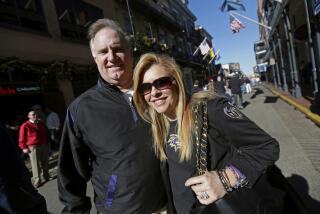THE 2 OF THEM : PRESIDENT REAGAN; The Role of a Lifetime <i> By Lou Cannon (Simon & Schuster: $34.95; 948 pp.)</i>
In his Bel-Air mansion and at Chasen’s, the retired star’s retainers and old friends still treat him like Hollywood royalty. Occasionally, he accepts invitations to display his dimming glamour at movie previews and charity balls. But the studio does not call. And yet the camera, with which he has had a long affair, suddenly focuses on him again. Ronald Reagan will take his close-up now.
Many of the producers, directors and screenwriters who staged Reagan’s Washington already have unreeled their memoirs. Shamelessly, they exposed the mechanics of how they made him the most beloved President of modern times. Nearly all of these pitiless accounts were driven by a remarkable disloyalty. Reagan’s greatest ability was to inspire the public’s faith in the happy ending, but those who worked most intimately with him were mainly inspired to faithlessness.
Lou Cannon, a reporter for the Washington Post, was almost like an ex-officio member of the Reagan entourage. With the exceptions of Nancy Reagan and Edwin Meese, Cannon was the only one who followed Reagan from his early days in California politics to his last day in the White House. No other journalist had his access.
“President Reagan: The Role of a Lifetime,” Cannon’s third book on Reagan, is the ultimate Reagan history by the closest of his objective observers. What separates the tone of this book from the other versions of the Reagan presidency (including those of most his former aides and the pathography of Nancy Reagan by Kitty Kelley), is Cannon’s profound sympathy for his subject, which at times crosses over into an unusual empathy. He even suggests that many of Reagan’s shortcomings may be attributed to being the child of an alcoholic father, noting that he himself grew up under the same burden.
The author is rigorously fair-minded, straining for balance at every turn, always trying to explain Reagan’s side of things. His bafflement at the “enigma” of Reagan’s intelligence leads him to construct a theory drawn from the work of Harvard professor Howard Gardner on “multiple intelligences.” Reagan might be weak on logic and analysis, according to Cannon, but strong on “interpersonal intelligence,” although he emotionally distances himself from everyone around him, even his wife.
Cannon’s diligent effort to understand the inner Reagan is utterly devoid of the slightest smirk. It is partly because Cannon’s motives and methods are unimpeachable that his book is the most devastating of all.
Cannon’s book covers the Reagan presidency from its start to its finish. He has unraveled all the major events and most of the minor ones with extraordinary clarity. It is the single most indispensable book on the inner workings of the White House and the precise contributions of Ronald Reagan to his own presidency. (The one piece glaringly missing would be about Reagan’s relationship with his vice president, who appears from the glimpses we see of him to have been much more involved in the decision-making than he has admitted.)
From his first campaign for governor of California, Reagan has been denigrated for having been an actor, as though his background were frivolous and dismissable. Cannon explains that Reagan’s Hollywood experience was absolutely central to his ways of thinking and modes of operation. He saw his presidency mostly in Hollywood terms, which had been so deeply ingrained that they were his second nature. Cannon does not use the Hollywood reference as metaphor or analogy, but literally. But how Reagan acted in his greatest role may be an unfair judgment on Hollywood.
Reagan hardly ever expressed himself at meetings with his senior staff or Cabinet. At any moment of boredom, which could be induced by any serious discussion of policy, he would simply nod off. The President’s top advisers commonly found him “inattentive, unfocused and incurious and to depart from meetings not knowing what, if anything, had been decided.”
Occasionally, he would interrupt the flow of serious talk with anti-government yarns dating to his days as a flack for GE. “But on other issues, especially when the discussion was over his head, Reagan’s participation was usually limited to jokes and cinematic illustrations. This is not surprising, as Reagan spent more time at the movies during his presidency than at anything else.”
On the 183 weekends he spent at Camp David, he usually saw two movies, and also viewed them constantly at other times. During the 1983 world economic summit, the only one held in the United States during his tenure, he never opened his briefing book beforehand, despite his staff’s anxiety about his performance. Afterward, Chief of Staff James Baker asked Reagan why he hadn’t looked at it. “Well, Jim,” replied Reagan, “ ‘The Sound of Music’ was on last night.”
In a meeting with congressional leaders on arms control (the fundamental facts of which Reagan was amazingly ignorant), his contribution was to relate the plot of the film “War Games.” “Reagan at least knew that ‘War Games’ was a film,” writes Cannon. “At other times he related cinematic scenes of heroism as if they were historical events.”
Colin Powell, the national security adviser, believed that Reagan’s surprise suggestion to Mikhail Gorbachev at the Geneva summit that they would unite if the Earth were invaded by aliens from outer space was inspired by “The Day the Earth Stood Still,” a 1951 science-fiction movie. Powell devoted a good deal of his energy to keeping references to what he called Reagan’s “little green men” out of his speeches.
(Reagan’s desire to construct an astrodome in outer space--the Strategic Defense Initiative--was partly inspired, according to Cannon, by Reagan’s reading of a novel, “Air Force One Is Haunted,” whose plot involves the ghost of Franklin Roosevelt whispering advice to the current President.)
Soviet leaders, Reagan informed his aides, were just like producers. “Reagan’s insistence on the analogy made his intelligence suspect to many of his Cabinet officers.” At the Moscow summit, to ensure that the President didn’t do anything like veer off into science fiction again, Secretary of State George Shultz assumed the role of director, coaching the President for his meeting with Gorbachev by instructing him on what he would do “in this scene.”
Although Reagan paid little attention at policy meetings, he avidly attended every screening of his campaign ads in 1984. He was so manipulated by his portrayal in the longest of the slick “Morning Again in America” that he cried. Reagan alone in front of a television set was his own best focus group.
Cannon’s exacting reportage reads like a collection of wild tales of a scheming court swirling around a deficient, feeble monarch, whose picture was lofted before the masses as an icon of strength and national glory. Behind the scenes, Cannon writes, “skilled subordinates learned how to manipulate Reagan by framing their advocacies to activate the response they wanted to produce.”
In his first term, his staff saved him from the political pitfalls of acting on many of his conservative beliefs. The result was a landslide reelection. In his second term, the shift in the White House staff from the James Baker-Michael Deaver regime to that of Donald Regan was catastrophic. The mistake was to let Reagan be Reagan--and William Casey be Casey and Oliver North be himself, and so on. Illusion ran riot.
The result, finally, was the Iran-Contra scandal, for which Reagan never really claimed responsibility. The word Cannon uses to describe Reagan’s response is “lying.” When the President appeared in closed session with the Tower Commission investigating the affair, “the real Reagan,” as only his protective staff had seen him, was on display--and the assembled wise men of Washington, who thought they had known him, were aghast.
Reagan’s presidency was rescued only with his opportunity, completely unanticipated by him, to play a supporting role to Gorbachev in ending the Cold War. Then, his utopianism, which his staff had long attempted to suppress, was his saving grace.
Cannon’s summary is carefully controlled, but withering. “The sad, shared secret of the Reagan White House,” he writes, “was that no one in the presidential entourage had confidence in the judgment or capacities of the President. Often, they took advantage of Reagan’s niceness and naivete to indulge competing concepts of the presidency and advance their own ambitions. Pragmatists and conservatives alike treated Reagan as if he were a child monarch in need of constant protection. They paid homage to him, but gave him no respect.”
It has become a commonplace that Ronald Reagan was to conservatism what Franklin D. Roosevelt, his early hero, was to liberalism. But Roosevelt was a strong executive, whose words corresponded to reality, and who always made his own plans. With enormously subtle adroitness, F. D. R. used his staff (and his wife, by the way) for his purposes, not the other way around. The two Presidents--the liberal patrician and his conservative pretender--could not have been more unalike. Roosevelt’s legacy was an energetic national government, Reagan’s a paralyzed one.
Perhaps this weak executive, who spread weakness through the federal structure in the guise of restored vigor, promoted his dogmas after all. But with the publication of Lou Cannon’s unassailable work of fact, Reagan’s historical reputation is in free-fall.
More to Read
Sign up for our Book Club newsletter
Get the latest news, events and more from the Los Angeles Times Book Club, and help us get L.A. reading and talking.
You may occasionally receive promotional content from the Los Angeles Times.






